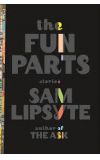
03 Aug 2013 04:49:04
Sam Lipsyte's hysterical prose is a bawdy objection to the pared-back austerity more typical of the current American scene. He spins out his lines at a breakneck clip, the riffs come thick and fast, and the gags are sprayed on with a machine gun. He is a detail-fiend, a maximalist, and he possesses an expansive linguistic imagination that can satisfy his leanings. Reading a Lipsyte story can feel like being collared and railed at in the street by a bearded, trembling and improbably erudite loon, and if you're a reader like me, this can make for a whole lot of fun. Those of a more delicate persuasion may find the effect obliterating. The burden of a gift like Lipsyte's is that such is the pace of the prose, it can be difficult to come down through the gears smoothly and allow moments of quietness, or tenderness, or feeling. When he does achieve this, as here in the wonderful story "The Dungeon Master", we get the measure of a large and sympathetic talent at work. It's a tale of gamer ennui and the sullen seep of teenage hormones, and it captures perfectly the pit-of-the-stomach dread that can dominate (and poeticise) a lonesome boy's adolescence. It also gives evidence that despite the ultra-contemporary sheen of his sentences, Lipsyte is at core quite an old-fashioned writer: his stories are neat machines, sturdily engineered, and in "The Dungeon Master" he's even prepared to risk a near-epiphanous finish.
Almost as impressive is "Ode to Oldcorn", in which the fattest boys in high school attempt to emulate the technique of "a shot putter from the hippie days". Of course the old-timer himself eventually shows up, wrecked by experience and the fading of his prowess. There is a waft of sadness at the edges of the story, a thin smoke that curls in and departs again, and it gives this short piece an odd, ungraspable power.
Elsewhere, Lipsyte can be a little self-conscious about the devices of his fictions – the eyebrow is often raised – and sometimes he doesn't so much tiptoe into archness as plough into it at 100 miles an hour. Details pile up in deranged accumulation, but he gives us so many we can forgive some clunky ones. In "Nate's Pain Is Now" (a very Lipsytian title) we get a misery-memoirist just as he begins to slide out of fashion, and it may be instructive here to quote its opening paragraph:
"Nobody wanted my woe. Nobody craved my disease. The smack, the crack, the punch-outs and lockdowns, all those gun-to-my-temple whimpers about my dead mother and scabby cat – nobody cared anymore. The world had worthier victims. Slavers pimped out war orphans in hovels hung with rat-chewed velveteen. Babies starved on the desert floor."
So do you like it or not? Is that "rat-chewed velveteen" a clinching micro-detail or too much information? Where does hallucinatory closeup bleed into overkill? Where you stand on such questions will largely dictate where you stand on Lipsyte.
But when he relaxes into a swath of dialogue you get the sense of a truly excellent ear, and his people are certainly mouthy. The best stories move along on the peppery burn of their talk. Here, from "The Climber Room", is a haughty waiter at some crucifyingly "artisanal" Brooklyn eaterie: "It's everything from the pig except the meat. Organs, hooves, eyelashes, lips. It's all pressed together in a loaf. I, personally, love it."
It's Lipsyte's work with the commas here, either side of "personally", that give us the rhythm, the bite, the haughtiness, the waiter.
The world these stories depict is exhausted by its own excesses and satiated beyond all hope. Everyone is damaged, or flailing, or obsessive. Everything is ironised, sometimes to an exhausting degree. If your taste is for a stripped-down, clear-as-glass style (what Martin Amis once called "vow-of-poverty prose"), then you are certainly in the wrong shop here. But it's important to stress that this madcap ranter is always deathly serious, and at his best, the thrum of comic energy can be near-Amisian.
As with any delicacy, it's probably best not to gorge on these stories. But ration them out over a few weeks and you'll encounter a writer's vision that is slant but acute. What we learn here, ultimately – and to quote one of the book's best lines – is that everything's weird if you look long enough.

